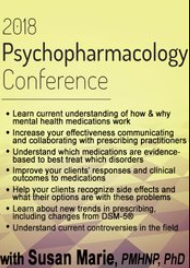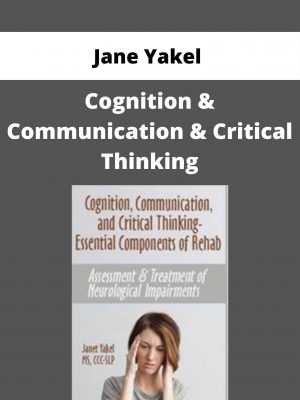Susan Marie – Psychopharmacology Conference
$439 Original price was: $439.$104Current price is: $104.
Shopping Instructions:
- DISCOUNT 15% : SHOP15
- Product Delivery: Within 1 – 12 hours after purchase.
Clients often only have a few minutes with their prescriber and require additional support. It’s vital that you are able to answer their questions, help manage side effects and understand reactions.
Susan Marie – Psychopharmacology Conference
- Psychopharmacology
- Drug metabolism concepts
- Drug mechanisms of action- what we know, what we don’t know
- Placebo effects- power & how to get it to work for your client
- When to refer for medication- pearls for increasing client interest and participation
- Developing highly effective collaborations with prescribers
- Depressive Disorders
- Neurochemistry of depression
- Controversy regarding antidepressants and placebo- Who to treat when?
- Types of antidepressants- pearls and pitfalls of different agents
- Managing side effects
- Treatment Resistant depression and drug combinations
- Anxiety Disorders & Obsessive Compulsive Disorders & Trauma Related Disorders
- Neurochemistry of anxiety
- SGAD, panic disorder, phobias
- OCD
- PTSD
- Physiological interventions
- Anti-anxiety medications
- Antidepressants
- The many other options often ignored
- Benzodiazepines: risks and benefits
- How to recognize problematic prescribing patterns
- Getting off benzos: key pearls for success
- Managing side effects
- Bipolar Disorders
- Neurochemistry and symptoms
- The Bipolar Spectrum concept & DSM-5® changes
- Types of mood stabilizers, when to use which and potential adverse effects
- Lithium
- Anticonvulsants
- Atypical antipsychotics
- Augmenting agents
- Effective strategies for improving outcomes for clients
- Using blood levels effectively- what the prescriber may not be watching
- Treating pregnant or potentially pregnant women with bipolar disorder
- Psychotic Disorders/ Schizophrenia
- Neurochemistry of psychosis and schizophrenia
- Antipsychotic Medications:
- First generation (typical)
- Second generation (atypical)
- Managing side effects
- Extrapyramidal symptoms and TD
- Metabolic problems- what blood tests are needed and when
- Preventing Diabetes Mellitus
- Recognizing hyperprolactinemia- and why you need to know
- Use of atypical antipsychotics for multiple disorders
- Pregnancy and psychotic disorders
- Attentional Disorders
- Differential diagnosis
- Neurochemistry of ADHD
- Controversy about treatment of ADHD with stimulants
- Substance abuse and ADHD
- Stimulant medications
- Non-stimulant options
- Managing side effects
- Sleep Disorders
- Sleep disorders
- Differential diagnosis
- Chicken or the egg? What came first, sleep problems or mental illness
- Controversy about treating sleep problems with hypnotics
- Sleep interventions that really work
- Hypnotic medications: risks and benefits
- Alternatives to hypnotics
- Recognizing adverse Effects
- Substance Use Disorders
- Neurochemistry of addiction & habit development
- Drugs of abuse and interaction with psychiatric medications
- Caffeine
- Nicotine
- Marijuana (discussion of medical marijuana, cost vs. benefit)
- Others
- Challenging the old thinking about when to prescribe for clients with dual diagnosis-what we now know
- Medication assisted treatments for addictions
- Alcohol
- Nicotine
- Cannabis
- Opiates
- Behavioral addictions- what we know works
- Eating Disorders
- Anorexia, bulimia, binge eating disorder
- Weight gain from psychotropic medications
- Recognizing medical emergencies
- Standard of care for lab work
- Integrating psychotherapy with psychopharmacology
- Special Populations: Geriatric
- Specialized guidelines for geriatric clients
- Discussion of dementia treatment
- Antipsychotic controversy
- Special Populations: Women
- Hormonal issues in mood disorders & anxiety
- Pregnancy and breastfeeding-
- Presenting the choices
- Resources for you and your clients
- The dangerous, the concerning, and the possibly good options for psychopharmacology
- Menopause- current knowledge and agents
- Treating Clients with Comorbid Chronic Pain
- Neurochemistry implications- why it’s critical to intervene
- When psychopharmacology can help
- Other alternative interventions
- Limitations of The Research & Potential Risks
Would you like to receive Susan Marie – Psychopharmacology Conference ?
Description:
- Learn current understanding of how & why mental health medications work
- Increase your effectiveness communicating and collaborating with prescribing practitioners
- Understand which medications are evidenced-based to best treat which disorders
- Improve your clients’ responses and clinical outcomes to medications
- Help your clients recognize side effects and what their options are with these problems
- Learn about new trends in prescribing, including changes from DSM-5®
- Understand current controversies in the field
Spend twelve action-packed hours learning about the newest advances in psychopharmacology and contemporary trends in medication management. From her unique perspective as a doctored psychiatric nurse practitioner, Susan Marie teaches psychopharmacology thoughtfully, with an emphasis on the experience of the client. Susan’s extensive 30 years of experience in mental health and passion for clients, shines through in the detail and thoroughness of her presentation.
Clients often only have a few minutes with their prescriber and require additional support. It’s vital that you are able to answer their questions, help manage side effects and understand reactions. Designed for counselors, nurses, psychotherapists, psychologists, and other mental health professionals, Susan provides the information you need in order to best help your clients.
This conference allows time for exploration of underrepresented areas, including ADHD, sleep, eating, and substance use disorders. Take home specialized guidelines for geriatrics, pregnant or nursing women, and clients with chronic pain. Discuss how the DSM-5® has impacted prescribing patterns and the use of psychotropics in newly defined diagnoses. In addition to a general ‘nuts and bolts’ review of medications, you will examine case examples, discuss medication controversies and how to effectively collaborate with prescribing practitioners.
Susan’s engaging presentation includes many take home “pearls” you can use to teach your clients about their medications and how to protect them from concerning, dangerous or adverse effects. You will find this conference to have the most up to date medication information and how to use it most effectively with your client.
Here’s What You’ll Get in Susan Marie – Psychopharmacology Conference
Susan Marie – Psychopharmacology Conference : Sample
Related products
NLP & Hypnosis
NLP & Hypnosis
NLP & Hypnosis
NLP & Hypnosis
NLP & Hypnosis
NLP & Hypnosis
NLP & Hypnosis
NLP & Hypnosis
iAwake Technologies – Beginner’s Mind (Neuroflow Series) [6 WebRips – WAV User Manual – PDF]













![Iawake Technologies – Beginner’s Mind (neuroflow Series) [6 Webrips – Wav User Manual – Pdf]](https://copicourse.com/wp-content/uploads/2021/08/iawake-technologies-beginners-mind-neuroflow-series-6-webrips-wav-user-manual-pdf-300x400.jpg)